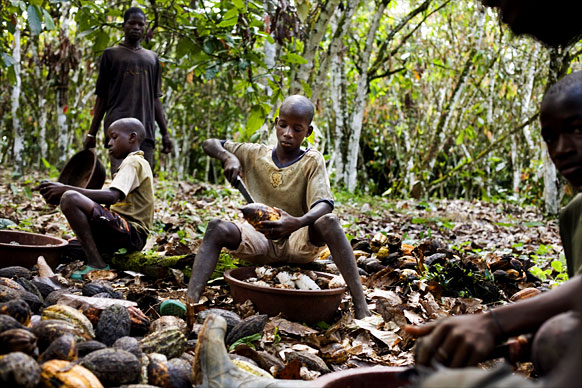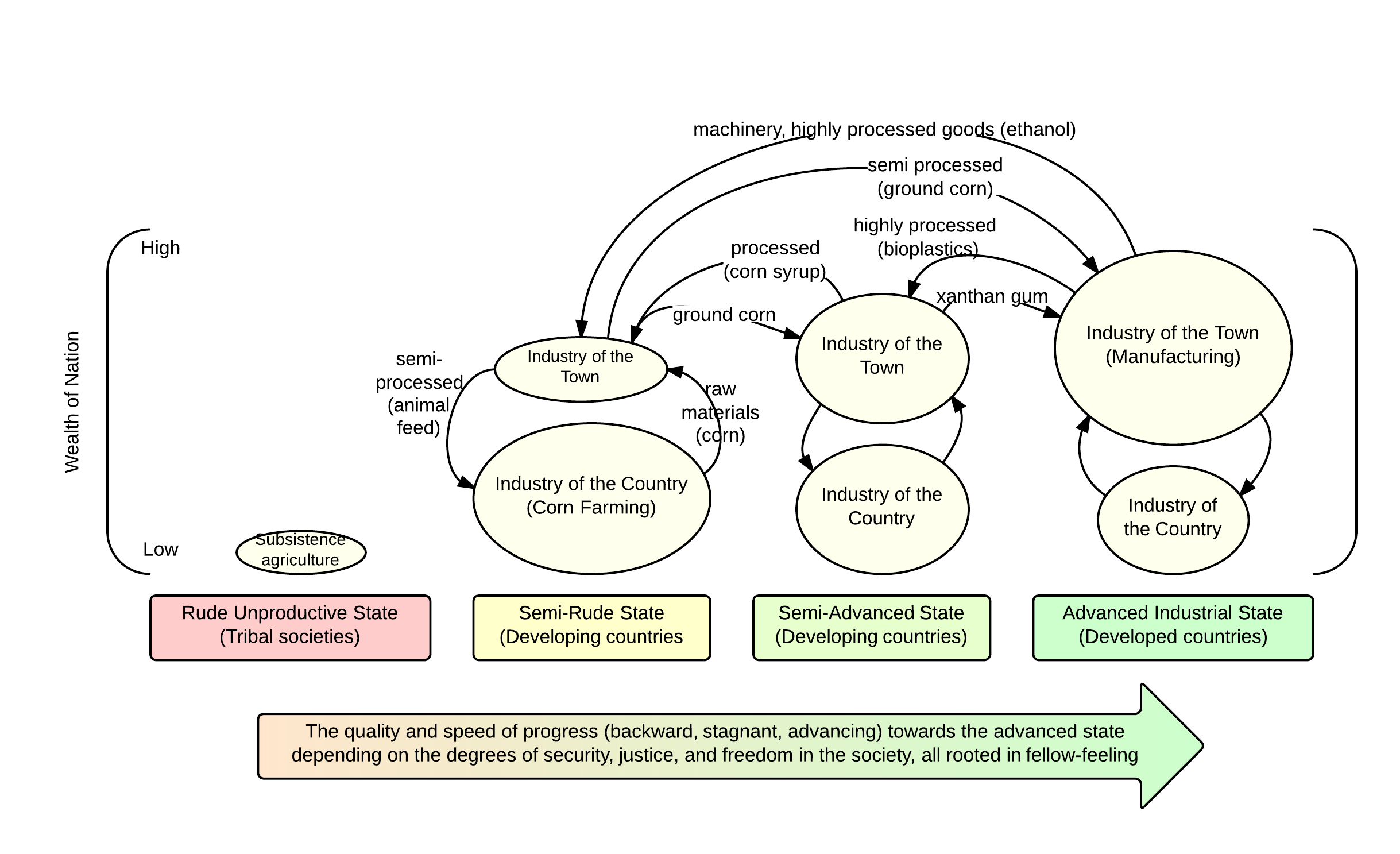Targetted Economic Development
August 21, 2015 8 minutes • 1553 words
Table of contents
Natural Economic Development
The main advantage of Supereconomics over Neoclassical Economics is that it is based on the dynamics of the human mind as explained by David Hume. This was later applied by Adam Smith into his Theory of Moral Sentiments and The Wealth of Nations.
To David Hume and Eastern philosophy, the mind is a metaphysical thing, different from the physical brain. Metaphysical things are less bound by space and time compared to physical things, and so the mind’s dynamics can remain the same throughout space and time.
This means that a human mind living 2,000 years ago can have the same basic dynamics as a human mind living today, and the same with a human mind 2,000 years from now living in a spaceship in a different galaxy. It will still feel pleasure and pain, and use logic to drive its actions in order to avoid suffering.
Thus, the same maxims given by Smith on economic development which he observed from the Roman times up to his time in 1776 will still apply to humans from 1777 onwards.
Key Ideas That Are Missing
Currently, the only maxim of Smith on development accepted by modern economists is comparative advantage. His other maxims (mostly in Book 3) have been conveniently disregarded because it goes against the commercial system.
1. Maxim on The Natural Sequence of Development
According to Smith, the natural and sustainable progress of economies is from agriculture or extraction first, then processing, and lastly, trade. In Smith’s system, the countries where natural resources come from should be the ones to process them as well.
For example, the Ivory coast exports cocoa. It should implement policies so that it will eventually make chocolates itself. This would solve child labour for good. However, this goes against the vested interests of chocolate corporations in richer countries which profit from the low cost of raw cocoa.

every prudent master of a family never attempts to make at home what it will cost him more to make than to buy. The tailor does not make his own shoes, but buys them of the shoemaker.. By making those cheap foreign commodities at home, the nation’s industry is thus turned into a less advantageous employment. The exchangeable value of its annual produce is reduced by such regulations, opposite of the intention of the lawgiver.
2. Maxim on Being Backward versus Being Advanced
Adam Smith classified the mentality of societies as either savage, barbaric, or advanced. He classified their economic state as either backward, stagnating, or advancing.
He called savage and barbaric ones as rude:
A rude society has more variety in individual occupations. but less variety when all occupations are taken together. Every man does almost everything which any other man does. Every man has a considerable degree of knowledge, ingenuity, and invention, but no one has a great degree of them. What they have is sufficient only for conducting the simple business of society.
He calls an advanced society as civilized:
In a civilized state, on the contrary, there is little variety in individual occupations. But there is an almost infinite variety in all the occupations taken together. A few people are not attached to a particular occupation. They have leisure and inclination to examine the occupations of other people. These varied occupations lets them think of an almost infinite variety of objects. This thinking then exercises their minds in endless comparisons and combinations. It renders their understandings extraordinarily acute and comprehensive. Unless those few were placed in very particular situations, their great, honourable abilities may contribute very little for their society’s happiness. All the nobler parts of the human character may be extinguished in the people.
There are differences in the dynamics of a society in a ‘rude’ or backward state and those of a society in an advanced state.
- Liberal policies work best in advanced, rich countries
- Austere policies work best in backward, poor countries
China, a poor country, adopted liberal policies immediately when it opened up in the ’90s. This created wealth imbalances, migration, ghost cities, wasted capital, increased pollution, territorial disputes and stock market crashes. The Chinese government finds itself clamping down on freedoms more and more.
Changing austere policies to liberal ones must be done gradually, just as a person cannot simply flip his entire mentality instantly and expect no bad effect.
Desolate countries such as those in the Middle East and Western China are naturally not suited for republican governments and liberal policies. Had the Bush administration known this, then it would have thought twice about establishing a democratic system in Iraq and Afghanistan.
3. Maxim on Using Transitory Mercantile Capital to Build Infrastructure
Since the interests of merchants are usually opposite that of society, the government should use temporary mercantile capital or ‘hot money’ to build its national capital so that when the merchants flee in capital flight, the nation would have enough local capital to sustain its own economy.
In today’s world, the merchant class dominates and is free to remove its capital anytime. When China opened up, American companies left the US, leaving a lot of Americans unemployed.
Update October 2023: After China’s government tightened its grip during Covid, foreign companies also left China and moved elsewhere, such as to Vietnam.
In this situation, the logical workarounds are for the government itself to:
- spend to maintain the economy in a system called Keynesian economics
- This is seen as welfare states, with policies such as Conditional Cash Transfers and Universal Basic Income
- go into business itself, as state capitalism
- This is best shown by China’s Huawei which dominates the telecoms industry.
Mercantile economists, on the other hand, would say that governments should not go into business simply because they want to protect their business interests from a very powerful competitor such as the state.
The Economic States of Society
Smith’s economic system can work in all states of society, from nothing or ‘state zero’ up to the advanced, prosperous state.
| State | Description |
|---|---|
| 0 | Has very basic necessities like water |
| 1 | Has habitation |
| 2 | Has electricity |
| 3 | Has production facilities |
| 4 | Has a port |
| 5 | Has a major port |
- State 0 happens after a natural disaster or war
- State 1 is where people live very far apart in undeveloped rural areas and live off the land (when people have some lodging and clothing)
- State 2 is a modern town or village with electricity
- State 3 is a major town or a city with production facilities and roads
- State 4 is a city with a minor port
- State 5 is a city with a major port
A people in State 1 will likely not have any technical skills nor even speak the national language. But they will likely have some skills in agriculture or in extracting natural resources. In this ‘rude state’, this will be their most important capital, source of revenue, and the center of their economy:

In the African case, the unskilled rural areas (State 1) of the Ivory Coast can produce cocoa beans. They can then look for more advanced societies (State 2) of bean grinders and roasters in towns to process the beans.
Those roasters can look for still more advanced societies in cities (State 3) to liquify the beans into chocolate butter for making chocolates. Those cocoa processors can then turn to commercial cities and ports (State 4 or 5) to export those chocolates overseas.
In this solution, the revenue of chocolate-making mostly goes to the Ivory Coast, instead of to overseas interests, allowing the Ivory coast to build its capital and wealth.

From Zero to Hero
The development of the rude state will then depend on the nature of the people, with some cultures being able to develop faster.
Regardless of culture, Smith guarantees that by allowing profit-sharing or giving the people the proceeds of their own work, industry and development can be sped up.






